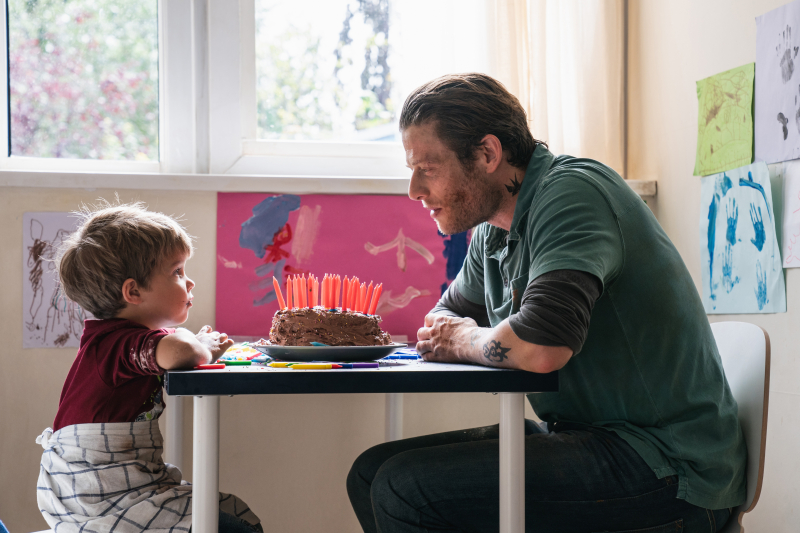
Peter Marley/Cohen Media Group
MOVIE REVIEW
Nowhere Special (2021)
It’s always a little sad when a child is given up for adoption, because it means that something, somehow, has gone wrong. But to acknowledge that you’ll be unable to raise your child and choose a better family for them is an extraordinary act of love. It’s the quiet sadness of “Nowhere Special” that gives that exceptional love its full power, especially as, for a movie about death and dying, it makes the unusual choice to be utterly focused on the future.
It’s only made slowly apparent why John (James Norton) is spending his time trying to select a permanent family for his 3-year-old, Michael (Daniel Lamont). Michael is a serious little boy who loves being read to, watching lorries and diggers go about their work and eating ice cream in the park. John is a window cleaner, covered in tattoos and completely focused on his son. He was brought up in foster care; and Michael’s mother was a Russian woman who ghosted them when he was 6 months old. His only friend is the much older Rosemary (Stella McCusker), a widow who became friends with John in a hospital. John is adamant that not only Michael is too young to understand the concept of death, but also that he should never know he's adopted in the first place. Their main social worker, Shona (a very good Eileen O’Higgins), does not agree, but for the most part she holds Michael’s hand as the prospective adopters chat to John and try to convince him to choose them.
The movie is set in Northern Ireland; and writer-director Uberto Pasolini made the rare decision to tell a Northern Irish story that has nothing whatsoever to do with the troubles, down to keeping the character names entirely neutral (a.k.a. ones which are used on both sides of the sectarian divide). The issue at the center of the film is class. John and Michael live in a small towerblock apartment wallpapered with Michael’s drawings, and must walk through a graffiti-covered underpass to get home. Most of the houses they see on their visits are outside the city and include large gardens and extra bedrooms. It’s equally visible that most of the people who have been approved to adopt are doing it for their own purposes. One mother (Siobhan McSweeney) talks about her regret at being unable to get pregnant; and one father (Keith McErlean) mentions the hope his child would go to the same boarding school he did. Another set of parents give Michael a stuffie during the visit but when it’s time to go refuse to let him keep it. In the aftermath of that visit John, quite justifiably, loses his temper at Shona, who stammers her apologies but is equally clear that, sooner rather than later, John must make a choice.
And what is so interesting about the movie is that we watch John consider the biggest decision of his life, and his little boy, largely in silence. He realizes he can no longer safely climb a ladder by slowly returning to earth, shaking from the effort. Michael draws on his arms in imitation of John’s tattoos and John realizes, without verbalizing a thing, what Michael’s going to remember about him in years to come. Michael begins carrying a toy lorry everywhere he goes and occasionally asking the adults he meets when they are going to die. Young Mr. Lamont’s quietly thoughtful performance here is on a par with Victoire Thivisol’s in “Ponette,” another movie about a very small child having to come to terms with parental death. As he drives around the city, John observes families in cafes or children crossing their street, families like he never had, and children of an age that he won’t live to see Michael become. And all the time death is a hovering presence, getting closer and closer.
Mr. Norton has worked largely in British television, spending five years as a sweet crime-solving vicar in “Grantchester” while simultaneously spending a decade terrifying everyone as the world’s most evil rapist in “Happy Valley.” He probably won’t do a movie this low-key again anytime soon, as he’s in the big leagues now (this was filmed in 2019, when he was on the cusp). Mr. Norton’s accent work is as usual impeccable; and his ability to be natural with a very small scene partner is astounding. Cinematographer Marius Panduru spends a lot of time hanging back, allowing us to watch John and Michael in the park or doodling in library books. Other times the camera is at Michael’s eye level, such as when John crouches under a table or when Michael very carefully carries a cup of water to where John is drowsing on the sofa. He sets it carefully on the table before climbing up next to his dad and covering his father’s hand with his little one. It takes unusual trust in actors as to render dialogue somewhat unnecessary. But then “Nowhere Special” is an unusual and unusually powerful film.
Comments